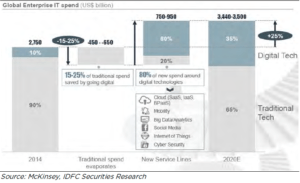Mindtree: Leading the Digital Charge

How an IT services provider is taking on entrenched competition by re-inventing itself as a Digital-first company
Mindtree Introduction:
Mindtree is a mid-cap information technology services provider based in India. The company’s Digital-first approach to offering technology services to its global clients has allowed it to create a sustainable competitive advantage in a competitive industry with a high degree of technology risk.
Industry Background:
The 1990s ushered in an era of economic liberalization in India, with several reforms introduced to transition the country towards a more free-market economy and encourage foreign investment. In this reformed regulatory environment, supported by an increasingly globalized and connected world economy, the Indian information technology services industry took off. Leading multinationals began turning to India as a sourcing destination for information technology services. Initially, companies like Texas Instruments, American Express, Swissair, British Airways, and GE, started captive (or in-house) units based in India to handle their information technology business needs.[1] Today, India is the largest sourcing destination for information technology services globally, accounting for approximately 67 percent of the global US$ 124-130 billion market, and employing 10 million people. A large, skilled talent pool of English-speaking graduates, proactive regulatory environment, and a friendly tax structure have made IT services a key industry in the country (accounting for ~10% of GDP and over 40% of exports).[2]
Digital IT Services – A Business Opportunity:
Today, enterprises need to constantly adapt to disruptive technologies to remain competitive. New digitally-focused companies without traditional brick and mortar assets are disrupting traditional business models. While most organizations recognize the need for an enterprise-wide digital transformation, many struggle to define and execute the transformation – this represents an opportunity for IT services providers globally[3]. The market for digital transformation in enterprises is estimated to be worth US$ 29 billion globally, and is expected to grow at over 30% every year in an environment of otherwise stagnating spend on information technology services.[4] According to a McKinsey study, enterprises are reducing spending in traditional IT services to fund investments in digital-focused IT services, specifically in the areas of Social, Mobile, Analytics, and Cloud (SMAC) technologies.[5] IT services providers are experiencing challenges to their profitability with increasing pricing pressure in their legacy IT services offerings.
Mindtree’s Approach to Digital:
In this context, Mindtree has taken a proactive, thoughtful approach to investing in and developing its digital IT services capabilities.
Service delivery model: The company has introduced a “right-sourcing” delivery model. Traditional IT services include a large offshore delivery component (delivery of services remotely, at a low-cost location such as India). Mindtree has recognized that Digital will require investing in digital transformation capabilities onsite (i.e., at the client site). The company’s strategy is to develop digital transformation capabilities (and resources, such as engineers) in key client geographies such as the US and the UK, albeit at a higher cost. This allows Mindtree to truly partner with their clients to help shape their digital strategy. The company then uses cloud technology to scale these digital projects offshore, to achieve cost containment at a later stage in the delivery timeline. To accelerate its positioning as a provider of choice for digital services, Mindtree has made four acquisitions in the digital space in 2015-16: Bluefin, Discoverture, Relational Solutions, and Magnet360.[6] A continuing focus on developing its digital capabilities, and financial investments in the space to acquire digital competencies, will drive significant value for Mindtree going forward.
Other Opportunities:
Mindtree should leverage its digital capabilities to transform its own organization. Several opportunities exist to improve the efficiency of its workforce, including automation of tasks, schedules, and staffing. Separately, Mindtree should continue to invest in mobility solutions for its employees globally, to improve team communication, connectivity, and accessibility. A market leader in the IT services space, Infosys, has expressed interest in pursuing investments in artificial intelligence, not only to offer services to clients, but to also improve its own operational efficiency – essentially treating “artificial intelligence as an amplifier” of its ability to innovate and deliver best-in-class services to its clients.[7] Mindtree should consider adopting this approach as well to maintain a competitive cost structure.
(730 words)
[1] The Outsourcing History of India, https://www.outsource2india.com
[2] IT and ITES Industry in India, India Brand Equity Foundation, http://www.ibef.org/
[3] Report on Indian IT Services, IDFC Securities, October 2015
[4] Report on Digital Services, Zinnov, June 2016
[5] McKinsey study quoted in report on Indian IT Services, IDFC Securities, October 2015
[6] Investor presentations, mindtree.com
[7] Indian IT needs to deliver global value to succeed: Vishal Sikka, Business Standard, November 11, 2016





Thanks for the interesting post. Clearly, the digital revolution has powered the business process and IT outsourcing space, creating jobs and wealth in developing economies like India and increasing profits for businesses in the West. Would like to learn more about Mindtree’s secret sauce, how does it compete with the likes of Accenture or Infosys, who also offer onsite assistance and consulting on digital transformation? Is Mindtree well capitalized enough to become a leader in AI? And if so, won’t AI replace the very need to outsource to lower wage cost countries like India?